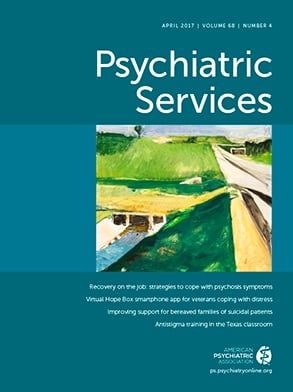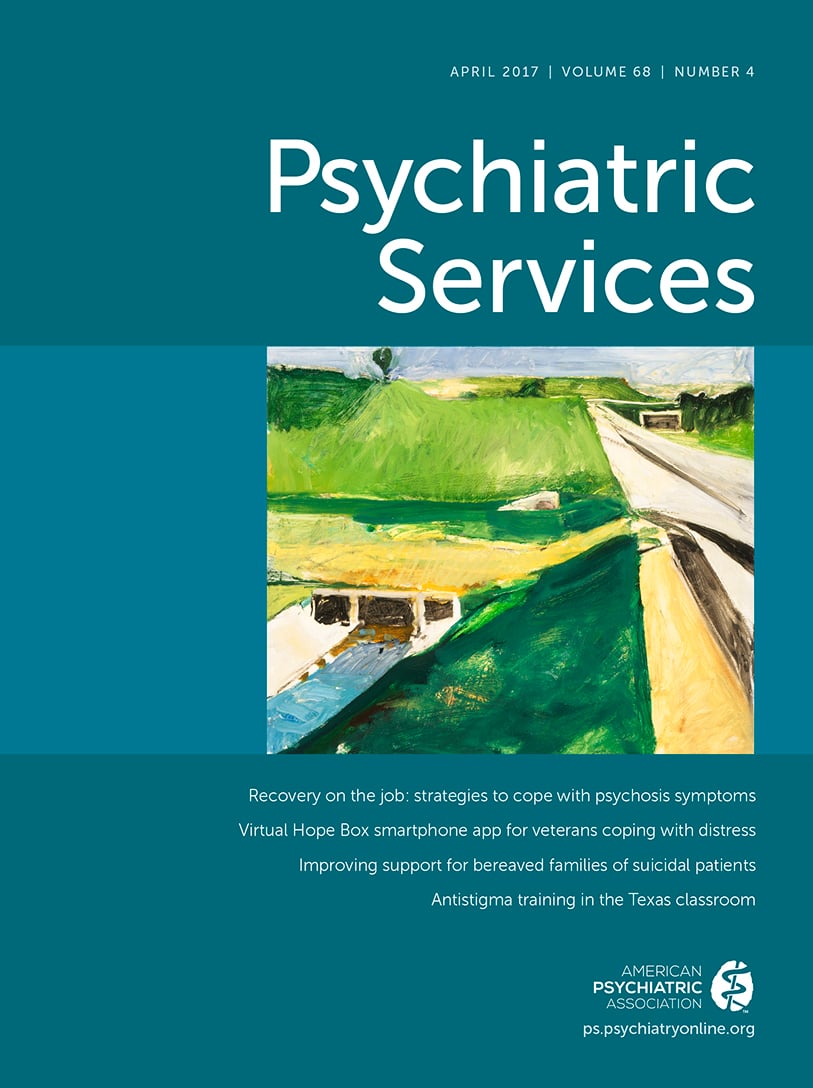Medical-legal partnerships (MLPs) bring legal and health care providers together to address civil legal problems that may affect the health of low-income or otherwise disadvantaged patients, such as those who are homeless or who have serious mental illness (
1). MLPs represent an innovative service model in which lawyers are integrated into health care teams to address diverse legal problems that affect vulnerable populations, such as food and income insecurity, lack of health insurance, poor education, poor housing conditions, and lack of personal stability and safety. MLPs were established out of recognition that health can be affected by social, economic, environmental, and other problems that are inadequately addressed by disease-oriented health care services (
2).
Although research on MLPs is sparse, existing studies suggest that MLPs can improve the condition of asthma patients (
3), positively affect the lives of cancer patients (
4), decrease barriers to health care for children (
5), help underserved populations in rural areas (
6), and be cost-effective for communities (
7).
MLPs have been established in more than 292 health care institutions in 36 states (
8), including several Veterans Health Administration (VHA) medical centers (
8). Many veterans served by VHA are disabled, poor, or homeless, and almost one-fifth have diagnoses of mental disorders (
9). VHA represents an ideal setting in which to examine how civil legal services can be provided within an array of comprehensive medical, mental health, social, homeless, and other specialty services. Moreover, although VHA has funded opportunities to address patients’ criminal justice problems with outreach to the criminal justice system through initiatives such as the Veterans Justice Program, there has been no formal program for civil legal problems that can affect health and impede recovery.
Available data suggest that legal problems are common among vulnerable veteran populations. For example, the annual Community Homelessness Assessment, Local Education, and Networking Groups survey has consistently found that legal assistance for four types of civil legal problems—eviction or foreclosure, child support issues, drivers’ license problems, and warrants and fines—are consistently in the top-ten unmet needs of homeless veterans (
10). Reports have also indicated that many veterans of operations in Iraq and Afghanistan have posttraumatic stress disorder (PTSD) as well as unmet needs related to housing, financing for housing, and financial aid for education (
11).
In this column, we describe the operations of MLPs at four VHA medical centers in Connecticut and New York and report on the characteristics of more than 700 veterans served by these MLPs from 2014 to 2016.
Partnership Models
In Connecticut, the Connecticut Veterans Legal Center (CVLC) has partnered with the VA Connecticut Healthcare System (VA Connecticut), which has facilities in West Haven and Newington. The mission of CVLC is to help veterans recovering from homelessness and mental illness overcome legal barriers to housing, health care, and income. This MLP originated when a volunteer attorney began providing free legal assistance to veterans on site at VA Connecticut and experienced a huge demand for his help. With a seed grant from Yale Law School Initiative for Public Interest Law and extensive negotiations with local VHA leadership and legal counsel, CVLC’s MLP with VHA was formally established with a memorandum of understanding between VA Connecticut and CVLC in 2009. CVLC is a nonprofit organization funded by grants and donations from charitable foundations, law firms, corporations, state agencies, fee-for-service contracts, and individuals. CVLC is physically housed within a psychosocial rehabilitation center at VA Connecticut and takes referrals from VHA clinicians. After referral, CVLC staff conduct an initial intake with veterans, obtain a waiver from veterans permitting their VHA clinician to share information with the legal team, and then work with veterans and all interested parties, including clinicians, to resolve the case.
In New York, LegalHealth, a division of the New York Legal Assistance Group, has partnered with the Manhattan campus of the VA New York Harbor Healthcare System and the James J. Peters VA Medical Center located in the Bronx for this project. The VHA MLP component of LegalHealth was established in 2012, although it has been providing free legal assistance to low-income New Yorkers with serious health problems at 26 hospitals and community organizations across New York City since 2001. The VA partnership was started because LegalHealth was serving most vulnerable populations but not veterans. To gain the interest of the VA sites in the MLP model, LegalHealth conducted outreach to VA administrators and senior-level medical officials at the two facilities and also reached out to the regional counsel’s office. Because of a national restriction on serving veterans on site at VA facilities, the program could not be started. Once a directive came from national VA leadership allowing legal providers on site, the early groundwork paved the way for an easy startup. The VA VHA MLP program was further expanded in December 2014, when LegalHealth established a clinic at the Northport VA Medical Center on Long Island (data for which are not presented here).
The overall LegalHealth program relies on foundation funding and hospital contributions and serves a broad patient population in addition to veterans. The VHA MLP program is solely supported by foundation funding. LegalHealth has its own offices off site but operates legal clinics a few days a week at its partner VHA facilities and takes referrals from VHA social workers, caseworkers, and clinicians. After referral, veterans are initially scheduled for a 45-minute intake meeting with the LegalHealth attorney. In addition, LegalHealth operates an intake line for veterans who self-refer in response to outreach fliers posted in VHA facilities. The callers are screened, and those in need of further legal assistance are scheduled for an appointment with an attorney at the clinic.
MLP Operations
Working collaboratively with all the project partners, the CVLC created a database that tracked the type and frequency of legal services provided to veterans through MLPs. The legal services these MLPs provided fall into four broad categories: administrative tasks; consult, meet, and interview; prepare, draft, and research; and appear for court or for hearings.
In Connecticut and New York, MLPs provided services to 791 veterans for 1,187 issues from June 2014 to May 2016. Almost all issues (98%) required MLP legal providers to consult, meet, and interview clients and other stakeholders, which represented most of the workload and took a mean±SD of 158±177 minutes per issue. Administrative tasks were needed in 48% of issues, and preparing, drafting, and research were needed in 68%. Notably, less than 10% of issues required a court appearance or hearing, although when they did, it required the most time per issue—201±222 minutes. Altogether, each issue took an average of 268±384 minutes, or 4.5 hours, to address. Some veterans had multiple issues, and thus an average of 6.7±9.1 hours were spent providing MLP services to each veteran. There was considerable variability in the intensity of services needed because some veterans needed only brief advice, whereas others needed full legal representation over an extended period.
Veterans Served by MLPs
Among 791 veterans served by the MLPs in Connecticut and New York from June 2014 to May 2016, the mean age was 52±13, 87% were male, 47% were white, 36% were black, 22% were married, and 36% were divorced or separated. There were no significant sociodemographic differences between veterans served by MLPs in Connecticut and New York, except that veterans in New York were more likely to be black. Among primary psychiatric diagnoses, 40% had a diagnosis of PTSD, 16% had a substance use disorder, 15% had a schizophrenia-spectrum disorder or bipolar disorder, and 8% had major depression. Data on military and homeless history of veterans served in New York were lacking, but among those in Connecticut, 57% reported a lifetime history of homelessness, 30% reported service in a combat zone, and 20% reported service in Iraq or Afghanistan.
Veterans presented to MLPs with over ten types of legal matters (consumer, criminal, employment, estate or probate, family, housing, military, public benefits, tax, VA benefits, and other). In Connecticut and New York, the top five legal matters were VA benefits (27%), housing (for example, evictions) (19%), family (for example, divorce or child support) (13%), consumer (for example, debt) (12%), and public benefits (for example, Social Security) (8%). [A figure in an online supplement to this column presents these percentages.]
Setting up an MLP
Based on the intake flow of veterans at MLPs we have profiled, there seems to be a clear need for legal assistance among low-income veterans with mental illness or homelessness or both. MLPs represent an opportunity to expand community-based partnerships with VHA to provide comprehensive care and to directly acknowledge and address social determinants of health.
It is important to note that VHA is currently not authorized to provide direct funding for legal services, although the Supportive Services for Veterans Families program provides limited grants to some community agencies that subcontract with legal providers to provide legal assistance for homeless veterans. Because legal organizations that partner with VHA facilities are not funded by the VHA, MLPs within VHA facilities currently rely on formal and informal private funding streams and grassroots fundraising by legal providers for this unique cross-sector collaboration. Although VHA does not fund legal services directly, the VA’s General Counsel’s office has issued a directive to VA facilities encouraging them to share space with legal services providers, and thus inquiries by attorneys to local VA leaders should be met positively.
Nonetheless, there are various resources available to help with starting MLPs in VHA or in other health care systems. The National Center for MLP serves as a technical assistance center and offers a startup toolkit, legal screening forms, and an active list of existing MLPs across the country (
12). Many organizations provide information online about civil legal issues and ways to access free or low-cost legal services (
http://www.lawhelp.org). A variety of media, videos, and other information is also available online for learning about MLPs (
13). Finally, many law schools and state bar associations are interested in MLPs and may serve as contacts for forming MLPs.

